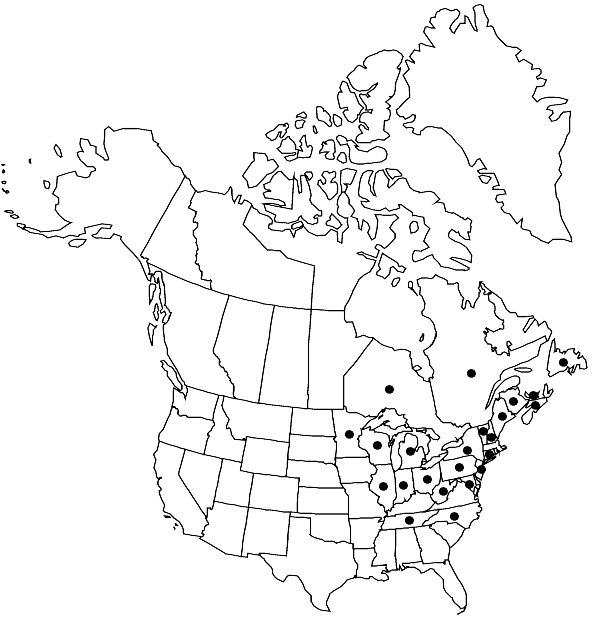Sphagnum flexuosum
in R. B. van den Bosch et al., Prodr. Fl. Bat. 2(1): 76. 1851,.
Plants small to moderate-sized, slender and soft, lax, moderately weak to moderately stiff-stemmed; green, pale yellowish green, yellowish brown, grayish brown or reddish brown; capitulum typically compact and twisted in the middle like a ball of yarn, spreading branches curved giving a pinwheel appearance. Stems pale green to pale brown, rarely with pinkish red patches, superficial cortex of undifferentiated to slightly differentiated cells. Stem leaves triangular-lingulate to lingulate, 0.7–1.3 mm, appressed to stem, apex obtuse to broadly obtuse and erose to somewhat lacerate, hyaline cells efibrillose and nonseptate. Branches curved, unranked to less commonly (in wet-grown forms) 5-ranked, leaves not much elongate at distal end. Branch fascicles with 2(–3) spreading and 2 pendent branches. Branch stems green but sometimes reddish at proximal end, with cortex enlarged with conspicuous retort cells. Branch leaves ovate-lanceolate to broadly ovate-lanceolate, 1.5–2.5 mm, strongly undulate and moderately recurved when dry, straight; margin entire; greater than hyaline cells on convex surface with 1–2 pores per cell at cell apex, on concave surface with round wall thinnings in the cell ends and angles; chlorophyllous cells triangular in transverse section and typically just slightly exposed on the concave surface. Sexual condition dioicous. Spores 23–25 µm; moderately to coarsely papillose on both surfaces; proximal laesura approximately 0.5 spore radius.
Phenology: Sporophytes uncommon, capsules mature early to late summer.
Habitat: Forming carpets in poor to medium fens, mostly sedge-fens and mire edge habitat
Elevation: low to moderate elevations
Distribution

N.B., Nfld. and Labr. (Nfld.), N.S., Ont., P.E.I., Que., Conn., Ill., Ind., Maine., Md., Mich., Minn., N.H., N.J., N.Y., N.C., Ohio, Pa., Tenn., Vt., W.Va., Wis., Europe.
Discussion
Of species in sect. Cuspidata with range and ecology similar to that of Sphagnum flexuosum, S. angustifolium and S. recurvum have rounded stem leaves. In S. angustifolium the stem leaves are more triangular and rarely erose while the branch leaves are narrower and more strongly 5-ranked. Sphagnum recurvum also has narrower and more 5-ranked branch leaves than does S. flexuosum, as well as a much more strongly differentiated stem cortex. In S. flexuosum the branch leaves are only slightly recurved whereas in S. recurvum they are sharply recurved.
Selected References
None.